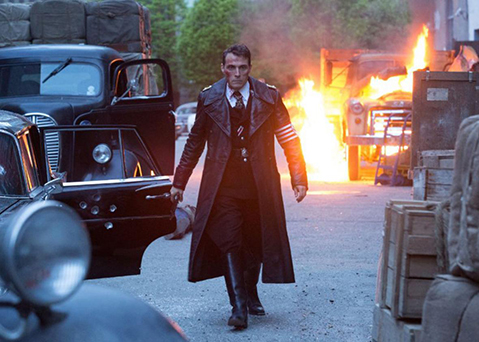‘The Man in the High Castle’
Amazon’s TV Series Is a Beautiful, Dark Vision of a Vision of History

Escape into television is almost always satisfying, but it rarely feels like an aesthetic destination. For a long time, I thought getting lost in a sitcom after a tough day was therapeutic, but never quite the same as tumbling through the cosmos with Stanley Kubrick or crossing deserts with David Lean. But TV has changed, and several shows now make me gasp in wonder: Game of Thrones, for instance, and USA Network’s dazzling Mr. Robot. The most cinematic, haunting recent show, though, is Amazon’s adaptation of Philip K. Dick’s alt-history classic The Man in the High Castle.
Dick’s premise is simple and daring: The Axis won World War II. We are set down in 1962 America, where the Third Reich controls everything east of the Rockies and Japan runs the west with a neutral zone in the middle. Meanwhile, the resistance movement tries to smuggle forbidden newsreels, collectively called “The Grasshopper Lies Heavy,” into the neutral zone. Why is not clear. Juliana (Alexa Davalos), an oppressed and willowy woman (though we first see her in a dojo, throwing big men to the floor), crosses paths with these films, though her fate seems more wrapped up in the questionable men in her life, one true but timid and the other capable of nearly every betrayal. Besides the love triangle, though, the plot’s real payoffs occur with regular reminders of how different this post-democratic America would be. Rufus Sewell plays SS officer John Smith, ruthless in politics but a sucker for his family. At one point in the plot, even he collides with the Third Reich’s blinkered world, and a vision of Nazi medical care builds our sympathy for him but also reminds us that Fascism was far worse than just right-wing politics.
What’s dazzling about The Man in the High Castle, though, is its visual style — shot in evening tones and presented on sets where windows within windows surround characters. Often a way to convey misperceptions and alienation, here the glass works to emphasize P.K. Dick’s obsession with paranoia. In fact, unreality is the point of the book and the TV series. With less talented minds this might have become just a political drama. Instead, the dark threads of the alternate universe wrap themselves around us, and by the end of the first season — another is coming later in the year — we’re lost in a vision of a vision of history and bad ideas never really left behind.



